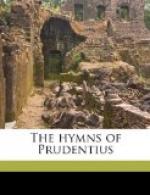pontificate of Zacharias (ob. 752 A.D.) point in this direction.
In the Spanish Church particularly the very ancient custom of
praying at the hour when the evening lamps were lighted had developed
into the regular office of the lucernarium, as distinct from
Vespers. The Mozarabic Breviary (seventh century) contains the
prayers and responses for this service, and the Rule of St. Isidore
runs: “In the evening offices, first the lucernarium, then two
psalms, one responsory and lauds, a hymn and prayer are to be
said.” St. Basil also writes: “It seemed good to our fathers not
to receive in silence the gift of the evening light, but to give
thanks as soon as it appeared.” It is probable, therefore, that
Prudentius intended the hymn for daily use, and that after speaking
of God as the source of light, and His manifestations in the form
of fire to Moses and the Israelites, his thoughts pass naturally,
though somewhat abruptly, to the special festival—Easter Eve—on
which the sanctuaries were most brilliantly illuminated. The
question is fully discussed by Brockhaus (A. Prudentius Clemens
in seiner Bedeutung fuer die Kirche seiner Zeit), and Roesler (Der
catholische Dichter A. Prudentius). Part of this hymn is used in
the Mozarabic Breviary for the First Sunday after Epiphany, at
Vespers, being stanzas 1, 7, 35, 38-41.
7 The words incussu silicis are perhaps
reminiscent of the Spanish
ceremonial of Easter
Eve, when the bishop struck the flint, lighting
from it first a candle,
then a lamp, from which the deacons lighted
their candles; these
were blessed by the bishop, and the procession
from the processus
into the church followed.
21 Cf. Vaughan, The Lampe:—
“Then
thou dost weepe
Still
as thou burn’st, and the warm droppings creepe
To
measure out thy length.”
119 The folium here is probably the ancient
malobathrum, generally
identified as the Indian
cinnamon. The Arab traders who brought this
valuable product into
the Western markets, surrounded its origin with
much mystery.
125 The following stanzas, in which Prudentius
elaborates the
beautiful fancy that
the sufferings of lost spirits are alleviated
at Eastertide, have
incurred the severe censure of some of the
earlier editors.
Fabricius calls it “a Spanish fabrication,”
while
others, as Cardinal
Bellarmine, declare that the author is speaking
“poetically and
not dogmatically.” That such a belief, however,
was
actually held by some
section of the ancient Church is evident from




